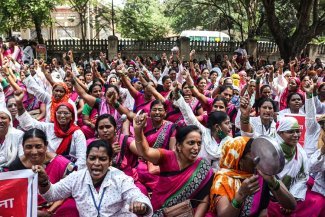After 37 years in power in Zimbabwe, Robert Gabriel Mugabe finally stepped down from the presidency last month, tendering in his resignation on 21 November.
Despite initially refusing to relinquish his authoritarian grip on the presidency after the military took control of the country on 15 November, eight days of popular protests, impending impeachment proceedings and mounting pressure from his ruling Zanu-PF party finally persuaded the 93-year-old leader to leave office.
Mugabe has been replaced by his erstwhile deputy and longtime ally, Emmerson Mnangagwa, who he had fired from both the ruling party and government three weeks back, triggering the crisis. Mnangagwa, a former justice and defence minister who had fought alongside Mugabe during the country’s long and bitter war of liberation from white-minority rule (1964 to 1979), was locked in a succession battle with Mugabe’s wife, Grace.
Despite his fearsome reputation for overseeing various acts of state-sponsored violence, including the infamous Gukurahundi massacres in the early 1980s, Mnangagwa was finally sworn in as president at the national stadium on 24 November.
But after the initial jubilation of ordinary Zimbabweans, the question on everyone’s lips is what will Zimbabwe after Mugabe look like? This question is especially pertinent for the country’s workers, who have borne the brunt of the country’s prolonged economic crisis.
Structural adjustment, a chaotic land reform programme and hyperinflation almost led the Zimbabwean economy to complete collapse in the late-2000s. Today, Zimbabweans still endure one of the highest unemployment rates in the world, mass poverty and significant international debt. According to a 2015 report published by the Solidarity Center, 94.5 per cent of the economically-active population works in the informal economy.
So, what is likely to change in the coming weeks and months? At his inauguration, Mnangagwa promised to focus on improving the lot of ordinary Zimbabweans. “We want to grow our economy, we want peace, we want jobs, jobs, jobs,” he told the crowd. But Japhet Moyo, secretary general of the Zimbabwe Congress of Trade Unions (ZCTU), isn’t convinced. “Generally, we don’t anticipate much change because Mugabe was the head of a system and it is likely to remain,” he tells Equal Times.
“All the people who have been assertive on Mugabe’s policies remain very visible in this transition; the likes of Mike Bimha [Industry and Commerce Minister in Mugabe’s last cabinet], Patrick Chinamasa [the former Finance Minister] and Paul Mangwana [the former Labour Minister].”
Mangwana is of particular concern for the unions, says Moyo, as he was single-handedly responsible for changing the Labour Act in 2005 without the consultation of the government’s social partners. This left public sector workers without the right to collectively bargain (only 5 per cent of workers in Zimbabwe are covered by CBAs) and, as a result, they have faced low pay, mass lay-offs and even no pay in recent years.
Wellington Chibebe, a former secretary general of the ZCTU and the current deputy general secretary of the International Trade Union Confederation (ITUC) until he takes up the position of director of the International Labour Organization (ILO) country office for Tanzania, Burundi, Kenya, Rwanda and Uganda in January, notes that while Mnangagwa has spoken about job creation, he hasn’t said anything about decent work.
“My fear is made worse by the emphasis on Special Economic Zones (SEZs) without any mention of labour rights. In most countries where SEZs have been implemented, slavery and slave wages are the order of the day,” he says.
Moyo says that a number of reforms and pro-poor policies need to be instituted to kick-start Zimbabwe’s flailing economy and to ensure the creation of more quality jobs. “Legislative reforms to remove over-taxing, the repeal of indigenisation laws to suit our situation and laws that deal with property rights,” are the most pressing changes, he says.
However, he was keen to point out that the ZCTU is opposed to “the neoliberal narrative because it is based on the oppression of workers through dangerous and imposed concepts such as labour market flexibility, austerity and ill-informed economic Structural Adjustment programs and the enrichment of a few individuals and corporates at the expense of the toiling masses.”
A clean sweep of “thieves and thugs”
Following the announcement of Mugabe’s resignation, the ZCTU issued a statement welcoming his “long overdue resignation” and calling on the “incoming President to immediately come up with a transitional mechanism that is inclusive of all Zimbabweans.”
It also called for a clean sweep of government of “thieves and thugs”.
“We also implore the new administration to inject fresh faces into government instead of recycling the same people who have failed over the years.”
Moyo says that after decades of authoritarian rule there is a need to instill a sense of belonging amongst citizens, and this can only be achieved if people are allowed to elect the leaders of their choice.
“A time frame-bound inclusive Transitional Authority should prepare the country to hold free and fair elections,” he says, in reference to the general elections that were already scheduled to take place on or before September 2018.
This call is also echoed by Zimbabwean trade unionist and political analyst Takavafira Zhou: “Free and fair elections should be held in 2018 and those who emerge victorious must be magnanimous in victory and build a credible government punctuated by corporate governance, transparency, accountability, efficiency and equity.”
The ZCTU is also calling for the restoration of basic socio-economic rights such as education and health for all, reliable and affordable public transport, decent housing, decent jobs, living wages, a reform of the current labour code, the establishment of a Truth and Reconciliation Commission, as well as the reform of state institutions (such as the police) that have until now been used to oppress citizens. In their place, the ZCTU is calling for responsive, open and accountable channels of government that work for the benefit of the people.
With regards to the question of whether the departure of Mugabe can help revitalise Zimbabwe’s decimated union movement (the ZCTU has lost three-quarters of its membership since the 1990s), Moyo says it is too early to tell. According to a report by the Danish Confederation of Trade Unions, many workers still have their union dues deducted from their salaries, “but employers are not remitting them to the unions”, which gravely affects union finances.
In addition, Moyo says: “The unions can only be revitalised if our membership increases and our bargaining power is bolstered. We still have the old system with a track record of anti-worker policies. The class of people at the helm are business people who might be worse than Mugabe.”
Gideon Shoko, Secretary of Labour for the main opposition party Movement for Democratic Change - Tsvangirai (MDC-T), tells Equal Times that it is “very difficult and too early to predict what the new administration will do for workers”. However, he says the unions can only be reinvigorated if foreign investors are persuaded to return to the country.
“If investors don’t come it will mean that trade unions membership will dwindle, making trade unions weaker and less attractive for those in full-time employment to join.”
Nonetheless, Moyo says that labour will continue to engage with the government of the day while striving to build workers’ power by engaging all sections of the community, particularly students, peasants and informal workers.
“Once everyone is empowered, it becomes easier for them to make informed, quality decisions when it comes to choosing candidates for public office,” he says.
Too early to celebrate
Various analysts told Equal Times in separate interviews that while President Mugabe’s exit was long overdue, the manner in which he was ousted raises questions about whether the desired outcome is the improvement of the lives of ordinary Zimbabweans or securing power and continuity for Zanu-PF.
Professor Mashupye Herbert Maserumule, who teaches public affairs at Tshwane University of Technology in South Africa, is cautious about the possibility of real change for Zimbabwe.
“For me, Mugabe is a microcosm of the bigger Zimbabwean problem, which is institutionalised in Zanu-PF. This problem is about patrimonialism. Mnangagwa has been part of it. So bringing him back as the President will not necessarily change anything Mugabe represented, for they are cut from the same cloth,” he says.
However, with the right leadership and good governance, Chibebe is confident that Zimbabwe can once again emerge as one of Africa’s strongest economies. “The country requires astute leadership to take Zimbabwe out of the current mess it finds itself in. It needs a captain who can stir the ship out of the murky waters, who shuns political rhetoric but one who marshals the democratic turnaround plan which must be results-oriented and timeline-based. If that can be put in, it won’t take more than five years for Zimbabwe to be back to its jewel of Africa status,” he says.
Whether or not this can be achieved in the next election cycle is another matter entirely. “My helicopter view of the current terrain is that the current political polarisation will not produce a free and fair election result,” says Chibebe.
But whatever happens Zimbabwean workers in the diaspora will be crucial to the country’s future. The economic hardships of the past decade resulted an estimated four million Zimbabweans – a third of its population - leaving the country to live and work in countries such as South Africa, Botswana, the United Kingdom, Canada, the United States and Australia.
In terms of economic power and human resources, their impact on the Zimbabwean economy could be huge. But Chibebe says Zimbabweans in the diaspora will not be easily moved to return home or invest in the country without seeing concrete signs of change.
“My advice to my colleagues both at home and abroad is that we should not celebrate potential, but rather learn to celebrate results. That said, if the government of Zimbabwe is serious in implementing policies as per the speech, that will definitely attract the diaspora.”









